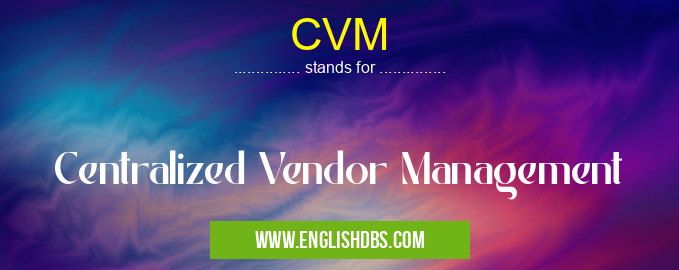What does CVM mean in MANAGEMENT
CVM stands for Centralized Vendor Management. It is an effective way to streamline and simplify the process of sourcing vendors, evaluating their performance and managing vendor relationships. CVM helps organizations to gain greater control over the entire procurement cycle, ensuring that customer requirements are met in a timely and efficient manner.

CVM meaning in Management in Business
CVM mostly used in an acronym Management in Category Business that means Centralized Vendor Management
Shorthand: CVM,
Full Form: Centralized Vendor Management
For more information of "Centralized Vendor Management", see the section below.
» Business » Management
Benefits of CVM
One of the primary benefits offered by CVM is cost savings by eliminating manual processes associated with purchasing goods or services from vendors. Additionally, it offers organizations greater visibility into their vendor network which allows them to make more informed decisions about who they buy from, where best prices can be found, or what quality products are available from each source. Moreover, CVM provides businesses with insights into market trends which can help them identify new opportunities or capitalize on current ones. Furthermore, it reduces time-consuming processes such as responding to vendor requests and monitoring shipments or orders through automation features built within the system. Finally, it increases compliance with government regulations as it simplifies document filing process for many suppliers or other business partners
Essential Questions and Answers on Centralized Vendor Management in "BUSINESS»MANAGEMENT"
What is Centralized Vendor Management?
Centralized Vendor Management (CVM) is an organizational structure designed to streamline the management of vendors and suppliers by a company. It enables the consolidation of vendor information and processes, such as the onboarding of vendors, requesting and approving purchase orders, tracking vendor performance metrics, collecting payments and more.
What are the advantages of Centralized Vendor Management?
Centralized Vendor Management improves efficiency for vendors and suppliers by reducing paperwork and simplifying processes like invoicing or requesting payment. CVM also helps to strengthen relationships between buyers and vendors by ensuring all communications are monitored in one place. Finally, CVM helps to reduce overhead costs associated with managing multiple vendors.
What types of businesses would benefit from using Centralized Vendor Management?
Any business that has multiple vendors or suppliers can benefit from Centralized Vendor Management. This includes retail stores, manufacturers, distribution centers, and other companies that need to manage vendor relationships across different locations.
How does Centralized Vendor Management work?
CVM provides a centralized platform for all vendor-related activities such as screening potential new vendors, generating quotes from existing vendors, issuing contracts and purchase orders, setting up electronic payments for invoices etc. This system consolidates all vendor data into one secure platform for easy access and management purposes.
Is there a cost associated with implementing Centralized Vendor Management?
Yes, there are costs associated with implementation since CVM involves acquiring software or technology solutions customized to fit your company's needs. Depending on your company's size you may require additional resources or professional services time to manage setup activities efficiently.
How do I select a suitable centralized vendor management solution?
When selecting a centralized vendor management solution it's important to select one that fits your business needs in terms of features, scalability options and pricing model. Making sure you select a software system that has advanced capabilities like automated processes or reporting tools will make sure your organization gets the most out of its investment.
Are there any special considerations for selecting a centralized vendor management solution for my company?
Yes — due to the specific requirements related to each company (such as number of users or products), it is important to examine each option carefully before making a decision on which CVM solution best meets your needs. Make sure to budget not only for the actual software but also any consulting fees or training necessary.
What kind of data can be collected through centralized vendor management solutions?
A centralize vendor management platform can provide real-time data on key performance indicators such as sales volume per supplier over time, safety records per supplier etc., allowing companies to identify trends within their supply chain more quickly.
Final Words:
Overall, Centralized Vendor Management is an invaluable tool for any organization looking to optimize their procurement process while gaining greater control of their vendors and increasing cost savings in the long run. By implementing this system within the organization's infrastructure they will benefit from increased efficiency combined with expert support making sure that all customer requirements are met in a timely manner.
CVM also stands for: |
|
| All stands for CVM |
